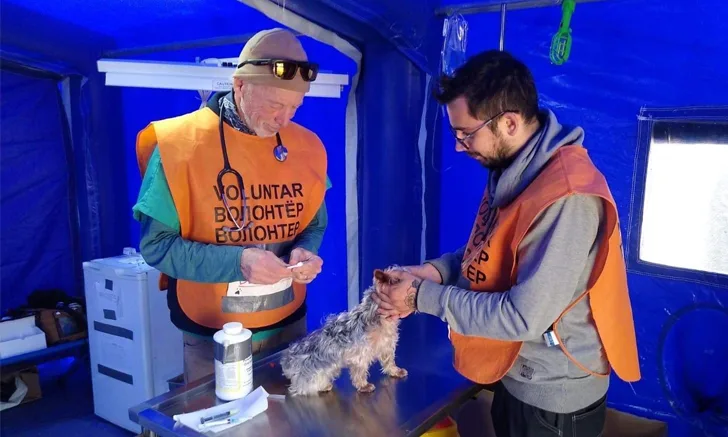
When veterinarian Jon Geller heard Ukrainians were fleeing their country and struggling to bring along their beloved pets, he stuffed his suitcases with medical supplies and headed for a Romanian border crossing to see how he could help.
Leaping Into Action
After years of working in emergency hospitals and running street medicine clinics for homeless people with pets, Geller figured he knew what to pack. But beyond a plan to "do something," he had no idea what he’d actually do once he got there.
"I'm the kind of guy who builds the plane while I'm flying it," said Geller, a 1995 graduate from the Colorado State University College of Veterinary Medicine. With a first career as a building contractor and a veterinary resume that includes mixed-animal mobile practice and ER relief work, you could say that Geller thrives on not knowing exactly what happens next.
Setting Up Camp
Once Geller decided to make the trip, he contacted Romanian veterinarians near Isaccea, a town on the Danube where ferries arrive from the southern part of Ukraine. These local veterinary connections helped get government approval for a temporary border clinic, and they recruited Croatian veterinary student interpreters, so the veterinary teams could get to work.
Calling themselves the “blue vet group,” after the blue tent that became their makeshift clinic, they provided free veterinary care for refugees’ pets. They were not in a war zone, said Geller. Most animals were well-cared for, but needed examinations, microchips, or vaccines for a pet passport that permitted travel in European Union countries. The teams also tended to the street dogs that roamed near the ferry terminal. The number of pets they examined each day varied with the influx of refugees.
Volunteers typically stayed 2 weeks or less, and Geller noted that many veterinarians and technicians who wanted to help could not take off time from work, as many veterinary practices suffer from staff shortages. Funds from groups such as SPCA International, American Veterinary Medical Foundation, Greater Good, and many personal donations helped cover volunteers’ travel expenses, while food and hostel-style lodging were provided through the international aid groups that showed up to support Ukrainian refugees.
Bringing Veterinary Medicine to the Streets
“It’s one of the best things I’ve ever done,” said Geller of his work in the blue tent. That’s a strong statement from a veterinarian who has dedicated countless hours to helping people and their pets far from his veterinary hospital.
Geller is the national director of the Street Dog Coalition, a nonprofit based in Fort Collins, Colorado, that he started in 2015 to bring medical care directly to the pets of homeless people.

Although Geller found most Ukrainian pets to be healthy, many needed rabies vaccines because they came from a country considered high-risk for rabies in dogs while Romania is a rabies-free country. But the rabies vaccines Geller packed in his travel bags were not licensed for use in Europe. Unfazed, he contacted veterinary vaccine manufacturers who donated and shipped the approved vaccines to the border crossing.
Street medicine is Geller’s antidote for the constant financial constraints of providing veterinary care—especially in emergency clinics, where clients often struggle to find funds to pay for trauma care, exploratory surgeries, or other costly procedures. No money changes hands. When veterinarians volunteer for the Street Dog Coalition, everything they need is provided, Geller said, thanks to a grant from Merck Animal Health that provides all preventive health products at no cost.
That frees volunteer veterinarians up to spend more time listening to pet owners, he said. There are no lab tests, no radiographs, and no referrals. “All you have is your hands and a medical history,” he said. “It’s very therapeutic.”
Street medicine is also about working with “both ends of the leash,” Geller said. That approach often involves public health issues, such as zoonotic disease, which is why he is now pursuing a master’s degree in public health. He hopes that human health caregivers join the Street Dog Coalition teams that currently serve more than 50 communities across the country.
Of course, Geller plans to help more Ukrainian pets and their people. As refugees begin returning to their homes, veterinary teams are now needed inside the country; in spay-neuter clinics, animal shelters, and even zoos.
“We spend our work days focused on patients, between four walls of a clinic, and then we go home and we do not engage with the world,” said Geller. Even if veterinarians can only volunteer for a few hours each month, they have so much to offer, he said. And so much to gain.
Know an extraordinary veterinarian?
We want to feature them! Nominate colleagues doing extraordinary work in the community. Fill out our submission form to nominate a veterinarian or veterinary team member here.